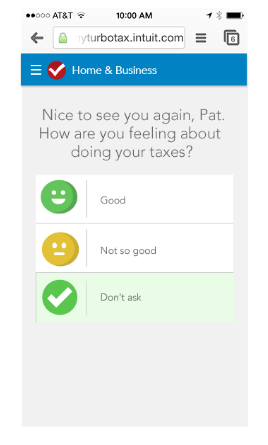TurboTax CTO: Data intelligence, mobile are behind strong 2016 tax season

Intuit's TurboTax offering has become a cornerstone of the company's portfolio, so it's no surprise that Intuit has doubled down its engineering efforts to make the software (and the tax filing process in general) more palatable for the everyman.
And if Intuit's recent 2016 tax season data is any indication, those efforts are paying off. Intuit says sales of TurboTax Online grew 15 percent year-over-year.
Sales of the desktop version, which have been on a steady decline, dropped one percent. Overall, TurboTax sold 33.9 million units, a growth of 12 percent from the previous year.
"We are really pleased with our focus on product innovation which has led to these results," said Nat Natarajan, CTO of TurboTax.
Among the product innovations Natarajan discussed, he highlighted Intuit's use of "data-driven intelligence" and the construction of an internal engineering platform named Fuego as key enablers for the TurboTax technology evolution.
On the data front, Natarajan said Intuit's data systems try to tailor the tax experience to the unit of one, as opposed to providing the same tax experience to each user.
For instance, when a TurboTax user asks a generic question, the software tailors the answer to be very specific based off of the user's personal information.
The company has also pushed forward technology like Optical Character Recognition (OCR), which lets users take a picture of their W-2 and other forms to auto populate their information in the software.
"Tailoring the user experience with the data we have about you is the most powerful lesson we have learned," Natarajan said.

On a more technical level, Intuit built an internal tool named "Fuego" that allows engineering teams to build a mobile-first app that can then be automatically rendered for all mobile platforms. Natarajan said Fuego was really the linchpin in creating Intuit's mobile products.
"When we declared mobile as the future of our business, we realized we didn't want to have multiple teams writing and rewriting software," he said. "But Turbotax has 50,000 screens and we had to make those screens render on different devices."
So they came up with project Fuego, which uses node.js and other open-source technology to build layers in the software in order to meet the form factor on every device. Now, everyone in the company is focused on mobile development.
"It is everyone's problem and priority," Natarajan said.
Still, Intuit's history as a desktop software provider is not lost in the company's new mobile-focused strategy. While sales of Intuit's desktop software have gone down, Natarajan insists they are still a healthy part of Intuit's business and the company will continue to invest in future iterations.
"Large parts of our business units share technology," he said. "We try to truly embrace common capabilities across the company."
Taking a step back, it's clear Intuit's 2016 tax season went off without the fraud fiasco of the previous year. In the midst of tax season 2015, Intuit was forced to put a temporary halt on e-filing state tax returns following the discovery of what the company called "suspicious filings and attempts by criminals to use stolen identity information to file fraudulent state tax returns and claim tax refunds."
A year later, Natarajan said Intuit has made tax fraud a bigger focus within the company. Intuit is working more closely with the IRS and others in the industry to ensure there are stringent security measures in place throughout the entire tax e-filing process.